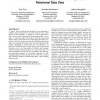Free Online Productivity Tools
i2Speak
i2Symbol
i2OCR
iTex2Img
iWeb2Print
iWeb2Shot
i2Type
iPdf2Split
iPdf2Merge
i2Bopomofo
i2Arabic
i2Style
i2Image
i2PDF
iLatex2Rtf
Sci2ools
107
click to vote
SIGMOD
2007
ACM
2007
ACM
The case for a wide-table approach to manage sparse relational data sets
A "sparse" data set typically has hundreds or even thousands of attributes, but most objects have non-null values for only a small number of these attributes. A popular view about sparse data is that it arises merely as the result of poor schema design. In this paper, we argue that rather than being the result of inept schema design, storing a sparse data set in a single table is the right way to proceed. However, for this to be the case, RDBMSs must provide sparse data management facilities that go beyond the previously studied requirement of storing such data sets efficiently. In particular, an RDBMS must 1) enable users to effectively build ad hoc queries over a very large number of attributes, and 2) support efficient evaluation of these queries over a wide, sparse table. We propose techniques that provide these capabilities, and argue that the single-table approach is a necessary component of selfmanaging database systems because it frees users from a tedious and potent...
Related Content
| Added | 08 Dec 2009 |
| Updated | 08 Dec 2009 |
| Type | Conference |
| Year | 2007 |
| Where | SIGMOD |
| Authors | Eric Chu, Jennifer L. Beckmann, Jeffrey F. Naughton |
Comments (0)

